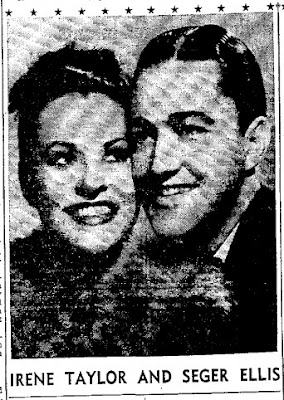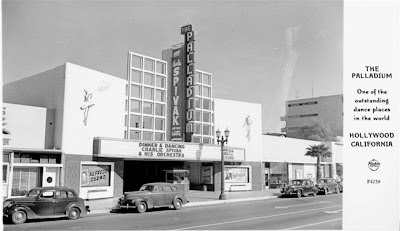We begin a new series of articles, spotlighting singers whose popularity has faded over the years and who, for different reasons, have unjustly fallen into obscurity. With the help of a very interesting CD released by The Old Masters and entitled Jazz in a Sentimental Mood, the first entry in the series is devoted to the lesser-known but great Houston-born vocalist/songwriter/pianist Seger Ellis.
At the outset of his career, Seger Ellis did not really want to be a singer. Rather, his main interest lay in writing songs and playing the piano, and it was indeed as a pianist with the now forgotten Lloyd Finlay Orchestra that he made his first recordings in 1925 in his native Houston for Victor. In addition to the sides he cut as part of the Finlay band, Ellis was asked to make some piano solo recordings, which were never issued due to technical difficulties during the recording process. However, Ellis would soon be summoned to Camden, New Jersey, by the label to wax his piano solos again, this time using the then newly introduced electrical recording method, and upon their release, these records were sufficiently well received by the public to persuade Ellis to launch a professional career as a recording artist in New York City. Incidentally, these early piano solos, most of which were written by Ellis himself, can be found in the excellent CD Black and White Piano, Volume 1 (Document Records, 1998), a highly recommendable collection that also includes cuts by Clarence M. James, Sidney Williams, and Lovin' Sam Theard, among other obscure 1920s pianists.
It should be noted that Ellis' intention at this stage was still to sell himself as a pianist, not as a singer. This would soon change, though, when he was encouraged by the small radio station on which he was appearing to sing as well as playing piano over the air. Thus, after his move to New York, when he made his first recordings for Columbia, the company decided to promote him as a crooner, marketing his records to rival those of Gene Austin, who was one of the foremost vocalists of the late 1920s, with smash hits such as "My Blue Heaven," "I've Got a Feeling I'm Falling," and "Five Foot Two, Eyes of Blue." Columbia's marketing efforts most likely explain why Ellis' voice sounds so high-pitched on his Columbia and Okeh records: this was a conscious attempt to make Ellis sound like other popular crooners of the era, such as Austin, Nick Lucas, Johnny Marvin, and Little Jack Little. In his excellent liner notes for the CD Jazz in a Sentimental Mood, Allan Dodge hints at the fact that Ellis was not thrilled by the sound of his voice on these sides, but he kept cultivating that style in view of the success of the records.
One of the attractions of Ellis' recorded output for Columbia and Okeh lies in the amazing personnel that accompanied him on most of the sessions, featuring some of New York's most prominent jazz musicians of the time. It appears that Ellis was granted the power to choose the members of the studio band for his recordings, and if that is the case, he certainly had a keen ear for good jazz, since he was often backed by highly accomplished musicians like Tommy and Jimmy Dorsey, Eddie Lang, Joe Venuti, Rube Bloom, Manny Klein, Hoagy Carmichael, and Muggsy Spanier, many of whom would go on to greater things during the Swing Era and beyond. Ellis himself played piano on some of the dates, and Eddie Lang's guitar is heavily featured on most of these very inspired arrangements, which are often quite adventurous, as in the case of Ellis' 1928 version of "Where the Shy Little Violets Grow," with an interesting steel guitar solo by Andy Sannella. In August of 1929, Ellis' studio band even included Louis Armstrong, who was then making his legendary series of hot five and seven recordings, on trumpet, and their reading of "Ain't Misbehavin'" remains one of Ellis' most enduring recordings.
At the time of this writing, there is only one full-length CD devoted to the music of Seger Ellis: Jazz in a Sentimental Mood, produced by the reissue label The Old Masters. Its title accurately encapsulates the defining elements of Ellis' style: his recordings are often sentimental, characterized by his high-pitched voice and relaxed singing style, but there is an undeniable hotness to them, and they are full of jazzy solos by some of the most important jazz instrumentalists of the period. In my opinion, the jazzy quality of the arrangements is precisely what differentiates Ellis' recordings from those of Gene Austin, whose accompaniments were not always comparatively as jazz-oriented. Ellis' repertoire consists of some of the best pop songs written in the 1920s and '30s, and all of them are so enjoyable that it becomes rather hard to name any favorites. The collection includes sides cut over a four-year period, between 1928 and 1931, featuring gems such as "If I Can't Have You, " "Cheerful Little Earful," "I Wonder How It Feels?" and Ellis' beautiful, pensive version of "It's a Lonesome Old Town." The remastering of these old 78s is excellent, and so are Allan Dodge's informative liner notes, which provide some interesting background for the recordings.
Ellis' recording career came to an end during the early years of the Great Depression, although he did assemble a big band in the late 1930s, bearing the odd name of the Choir of Brass Orchestra and featuring his wife, Irene Taylor, as the vocalist. Interestingly, though he did not record his own songs for Columbia and Okeh, he remained active as a songwriter, composing popular songs like "Little Jack Frost Get Lost" and "You're All I Want for Christmas." He passed away in relative obscurity in Houston in 1995, but as the twenty-six songs included in Jazz in a Sentimental Mood clearly show, his very appealing, jazz-influenced singing deserves higher recognition that it has received.
Videos
There are several videos with Seger Ellis recordings available on YouTube, among which we recommend the piano solo "Shivery Stomp," "Here Am I (Broken Hearted)" (a tune also recorded by Johnnie Ray in the 1950s), "Should I?" and "Without You Sweetheart." There is even an interesting, though undated, radio interview with Seger Ellis and Smith Ballew recorded late in their careers.
WHAT LISETTE MODEL CAPTURES FOR US
-
I know of no photographer who has photographed people as inwardly as
Lisette Model. Berenice Abbott Jazz aims straight at our ears. Since so
much of the mu...
14 hours ago




































